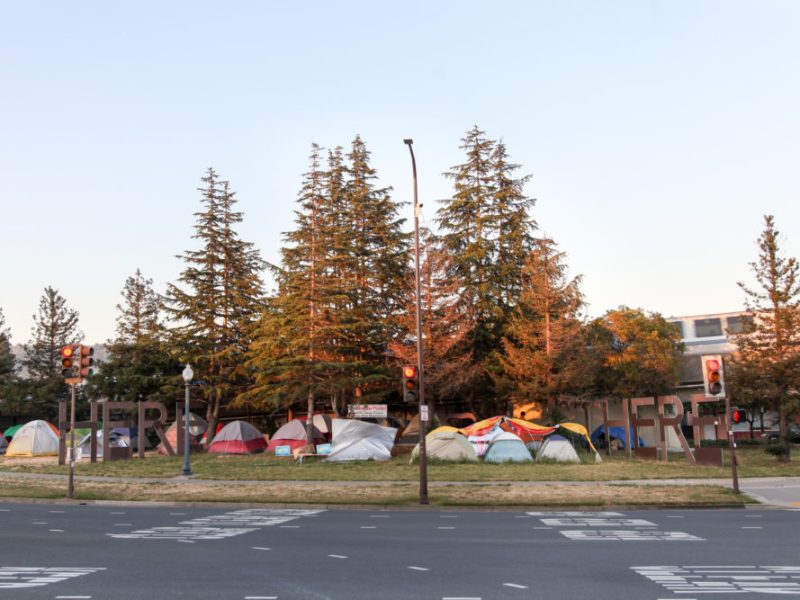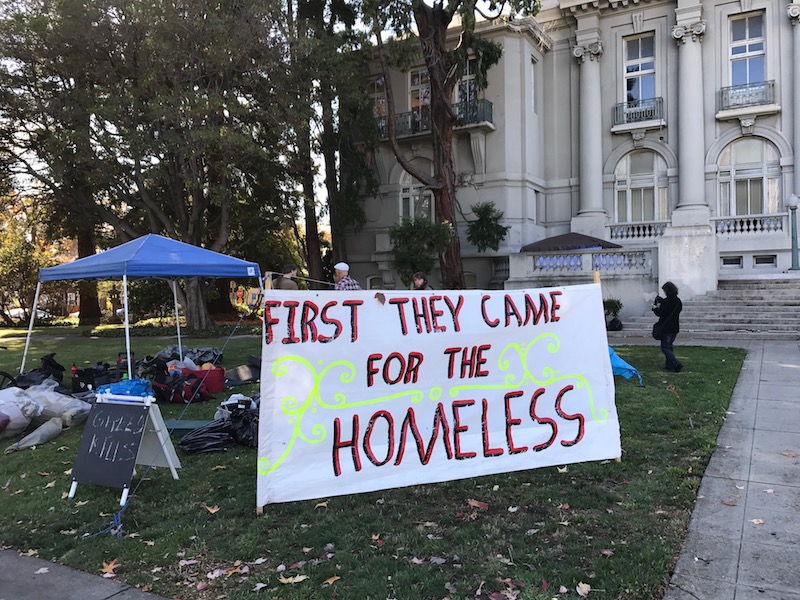
Berkeley officials closed the prominent Here There encampment on the Berkeley-Oakland border this week, six years after the protest movement put down roots in the intersection to call attention to homelessness and the housing crisis in Berkeley.
By the time it closed, only six people were living at the camp. They all took temporary shelter beds from the city at the Super 8 motel on University Avenue (at California Street) through the Alameda County winter shelter motel voucher program, and there was minimum pushback against the closure.
Residents will be allowed to stay at the motel for 60 days while the city says it will work on arranging permanent housing for them at apartments.
At the encampment on Monday, Julio Lee was one of the last residents who hadn’t moved out yet. His priority was his pets — Kt the dog, and cats Knowmie and Banxi. His support animal paperwork hadn’t cleared for the motel for all of them, and he felt a trailer offered by the city wouldn’t be better than living in his vehicle that’s usually parked outside Here There.
The city began doing outreach at the encampment in December and posted a final notice over the weekend, according to the city’s Homeless Response Team Director Peter Radu. When the time finally came, Lee still had to scramble to gather his belongings. Animal services took Knowmie on Tuesday, but Lee said he’d gotten her back a day later.
Two other residents, Marcos Hernandez and a resident who goes by Osa after an African deity, moved into the motel earlier this week. Osa said she was looking forward to being housed, saying it would be vastly better than the encampment, which in recent months struggled with a buildup of trash, rodents and mold.
Activist groups and neighborhood email threads were activated when the encampment was first served the closure notice over the weekend, but residents were mostly ready to leave the space.
As with encampment closures throughout the city, some questioned whether the housing offer was less an offer than an ultimatum.
Phoebe Thomas Sorgen, a former Berkeley Peace and Justice commissioner who has been active in supporting the Here There encampment and other homeless advocacy organizations in Berkeley, said she’s concerned about whether residents will find permanent housing after the motel stay and what they’ll do without their tents if they don’t.
“I think it’s fine to offer [encampment residents] that option, and that’s a humane thing,” Sorgen said. “But it should not have been a choice between moving to a hotel for 60 days or losing everything that you own. Because in 60 days you may need those tents, there’s no guarantee that they will have shelter in 60 days — but there should be.”
The city will keep some items at the Corporation Yard for a limited amount of days based on its storage policy, but that doesn’t include any soiled or moldy items.
South Berkeley Councilmember Ben Bartlett, who has been overseeing the neighborhood since the encampment’s inception, said the city has made major investments in homeless services and housing since the protest movement took hold, and he’s confident the city will find housing for the displaced encampment residents.
“Ultimate, the [city] and county have a pretty good track record with housing people, and I have no reason to believe that it won’t work,” Bartlett said, referencing outcomes of the city’s pandemic housing programs, like Project Roomkey and Homekey, as well as numbers that show Berkeley’s homeless population decreased slightly while regional numbers increased last year.
When protesters established the encampment in 2017, Bartlett supported their vision and said they were peaceful neighbors. At town hall meetings Bartlett held that year, activists pushed him for services like portable toilets and trash services. The city later began paying for a toilet set up by the late Margy Wilkinson, who was active with Friends of Adeline, and added a hand-washing station during the pandemic.
But in recent months, trash and debris piled up at the site, and a rat infestation took hold, according to the city and residents who lived there.
“For a good while, they were a good model for cooperative living; they helped people find housing,” Bartlett said. “They’ll definitely go down as a notable chapter in South Berkeley’s history.”
Here There was founded by a generation that has suffered many recent losses
The encampment, which existed on the Adeline Street corner just south of Alcatraz Avenue for about six years, first began with the “Poor Tour” movement in 2014.
Members of First They Came for the Homeless, which more recently advocated for residents at encampments by Interstate 80, settled in the green triangle on BART land after being shuffled around numerous times between Old City Hall and other public spaces.
Eventually, BART pushed the residents off their property and erected a fence around the lawn. The current iteration of the camp spanned a long crosswalk from Berkeley into Oakland, and would shudder with the sound of screeching BART trains throughout the day.
One distinct, organized group of residents at the encampment belonged to a sober camp with a list of conditions around mutual living, but throughout its history residents experienced disagreements with people who didn’t follow the rules.
Lee, who first moved to Here There in June 2020, said those disagreements and a lack of respect for the encampment’s cleanliness and order increased over the last few months. He said he was one of the only people maintaining a trash pickup schedule or caring for the site, and it got to be overwhelming.
Here There also suffered from the loss of its founders — Mike Lee, Mike Zint and Clark Sullivan — who all died during the pandemic.
“There was always a bit of a balancing act between neighborhood supporters and those who took issue with the camp,” Bartlett said. “With the loss of Michael Zint and Michael Lee and some of the elders, the character of the camp changed a bit.”
Bartlett said the camp “lost its way” after the elders died, and fell into worsening health and safety conditions.
Pastor Preston Walker lived at the Here There encampment in 2017, and briefly moved around with the protest group before they arrived at the camp’s final location. He said he and others endured 5 a.m. sweeps by Berkeley Police before the city ultimately decided to leave the camp alone.
He eventually moved to Oakland, and now lives in an apartment in Fremont. He said the Here There camp survived for a long time with a goal of “everyone taking care of everyone else,” but the passing of its core leaders, many of whom were former Occupy San Francisco, Berkeley and Oakland protesters, changed the spirit.
“When those three left this earth, things at the camp began to fall apart, because all the strong leaders were gone,” Walker said. “And that really hurt the movement.”
On Tuesday night, the former camp — which at its peak had about 20 communally-living residents — had been replaced by a chainlink fence wrapping around the entire half-block.
BART trains continued to whiz by, and residents walking home in the neighborhood stopped to observe the dramatic change in landscape.
Some wondered where the former residents had gone, and others remarked that they hoped they were inside somewhere warmer in an especially chilly winter.


